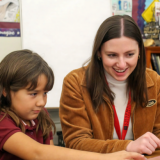Christmas Art Project: Balancing Religion and Education Equality
December 18, 2013

I recall very few details of my elementary school experience, but this time of year I do remember one incident that took place during my 4
th-
grade school year. It was Christmas time, and the teacher was preparing the supplies we would need for a holiday art project. The details of the project are not in my memory; I can’t remember handing my mother a homely decorated spool of thread or
TV Guide
origami-like Christmas tree. In fact, I don’t even have memories of glitter- something you would imagine I would never forget because I am all about
bling
! While the product of that art project has long disappeared, I carry with me a memory that lives with me.
As part of her lesson preparations, the teacher had to find a place for Jacob. He could not participate in the Christmas art project and would be spending time in another classroom. As I cleared my desk to prepare for the activity, the commotion began. Renee, a busy-body student whose nose was always in everybody’s business, was objecting loudly. She shouted, “If Jacob can’t do the project, I won’t do it either. That’s not fair!”
End of memory.
I later realized what happened in that 4
th
-grade classroom. Jacob was a Jewish child. The teacher was trying to provide an alternative for him while the Christian majority took the opportunity to celebrate Christmas traditions. Now knowing this, I wonder about Jacob. How did he feel about being removed from his classmates? Was he old enough to comprehend why? Did he judge our traditions? Did we judge his? How many other times did this story (or a similar one) repeat itself? I also wonder how the other students understood the series of events. Was the class given the opportunity to learn from the presence of religious diversity present in our classroom?
Fast forward to my own teaching experiences. In working with Muslim and Jewish youth, I have been confronted with the reality of a Christian-centered academic calendar and how it privileges and marginalizes. While Christians are assured time off for religious observances, students of other faiths must make arrangements to complete missed assignments. In most cases, it is an accepted practice by all involved. However, when the issue of attendance is the focus, there are some serious inequities.
Non-Christian students, while afforded the right to be absent for their religious practices, face the reality that these absences remain on their academic record. Young children who strive for perfect attendance awards must forego the recognition of this achievement. In some instances districts have created Saturday school make-up sessions in an effort to recoup per-student funding that is lost when students are absent. It is a pretty creative solution to this funding issue. However, despite the student’s effort to attend these Saturday sessions, the absence is not removed from their record. Only the school district benefits from this elaborate plan.
There is much rhetoric about educational transformation. The ideas of collaboration, critical thinking, and cooperation are often stressed. If we truly believe these ideas are the future of education, then we must reconsider how we can reconfigure our educational spaces in a way that exemplifies these ideas in practice. Surely, removing children from classrooms cannot be our most creative solution.
For valuable information related to religion in public schools, please visit
http://www.freedomforum.org/publications/first/teachersguide/teachersguide.pdf

